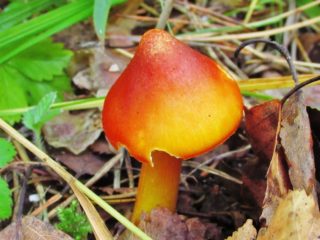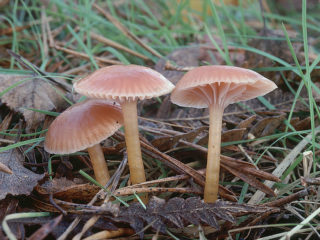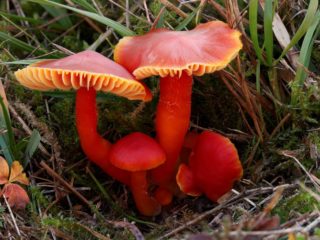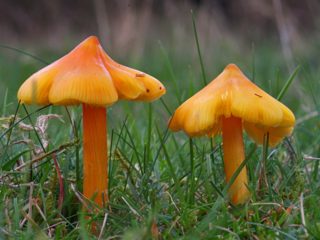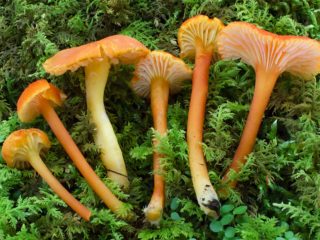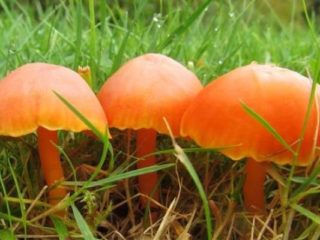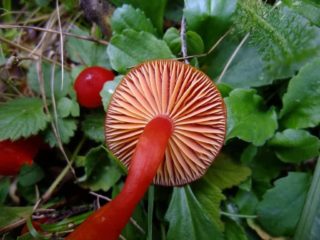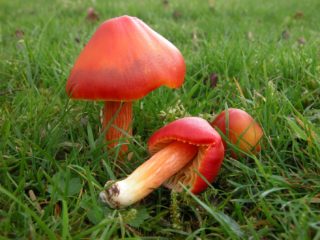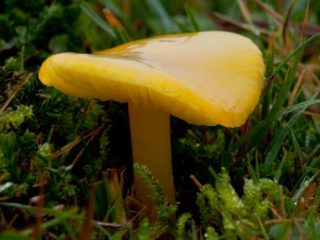Content
A bright beautiful mushroom from the Gigroforovye family - the red hygrocybe The Latin name of the species is Hygrocybe coccinea, Russian synonyms are crimson, red hygrocybe. Basidiomycete got its self-explanatory name due to the bright color of the entire surface.
What does a scarlet hygrocybe look like?
The fruiting body consists of a small cap and a thin stem. They are colored crimson. The plates are slightly different, have a yellow tint.
The hat of young specimens is bell-shaped. Over time, it becomes prostrate, a small depression appears in the center. Its diameter does not exceed 5 cm. The edges are thin, cracking in old fruiting bodies.
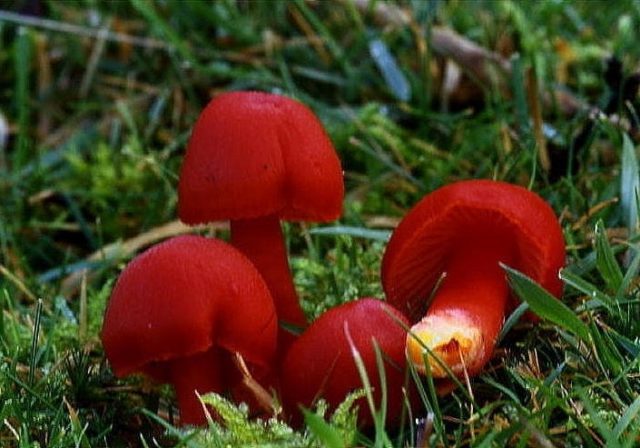
The color can have all shades of scarlet or orange, it depends on the place of growth, weather conditions, age of a single specimen
The skin covering the surface consists of small bubbles. The pulp of the upper part of the fruiting body is thin, orange with a yellow tinge. It has no pronounced taste and smell. Does not change color when broken.
The plates are wide, thickened, can branch, are rarely located. In old mushrooms, they grow with teeth to the stem. Their color repeats the color of the fruiting body.
Spores are oblong, elongated, ovoid or ellipsoidal, smooth. Spore white powder.
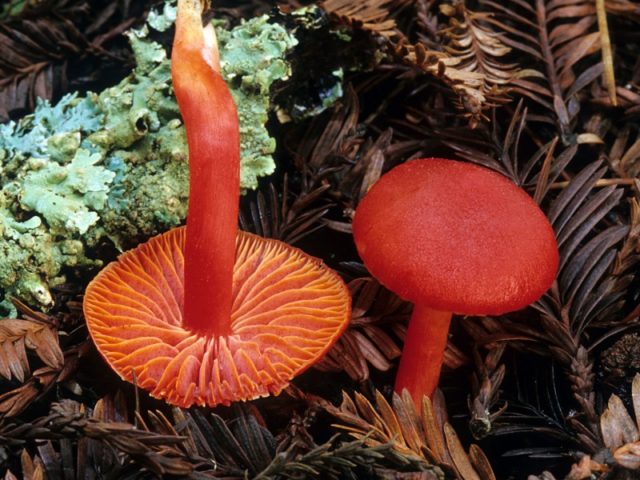
The leg does not grow more than 8 cm in length and 1 cm in diameter, it is thin, fibrous, solid, cylindrical in shape
In old mushrooms, it can bend as it grows. On the sides, its shape is slightly squeezed. The upper part is red, brightens to the bottom, becomes yellow. There are no rings on the leg.
Where does the hygrocybe of scarlet grow
These purple basidiomycetes are found in the humid forests of Europe and North America, in clearings, densely overgrown with grass and well-lit by sunlight. In Russia, scarlet hygrocybe is rare, mainly in the European part of Russia.
Scarlet caps can also be found in meadows with poor soil, where other species do not survive. Fruiting occurs from July to September. Fruit bodies grow in small clusters.
Is it possible to eat a scarlet hygrocybe
The described species is conditionally edible, but does not possess high taste. The bright scarlet color often scares away lovers of quiet hunting, they believe that they have met a poisonous specimen. But the scarlet hygrocybe can be collected and cooked. It is usually boiled or fried.
False doubles
Many species of the Gigroforov family are similar. Some of them are almost impossible to distinguish from each other. Only an experienced mushroom picker can do this.
Hygrocybe crimson
Her cap is conical or bell-shaped, maroon. There is a small ledge in the center. The diameter of the cap is several times larger than the described brother and can grow up to 12 cm.
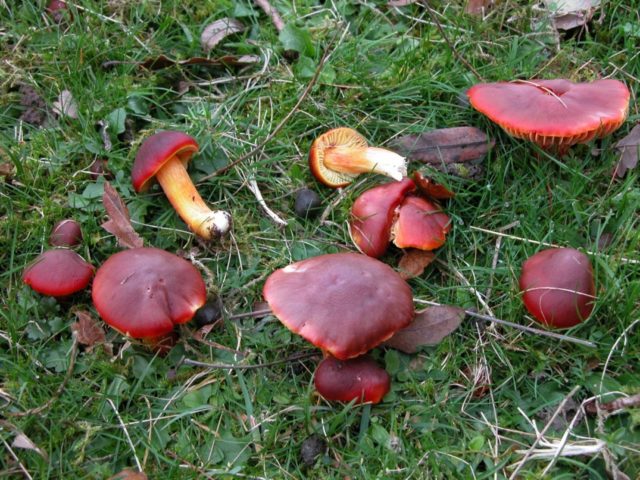
The leg of the double is light, yellow and thick, the entire surface is dotted with grooves
The pulp is thick and tough and has a strong, unpleasant odor.
Crimson hygrocybe is considered edible, mushroom pickers note its pleasant taste.
Hygrocybe oak
The mushroom has a conical elongated cap. In wet weather, its surface becomes slimy, sticky.
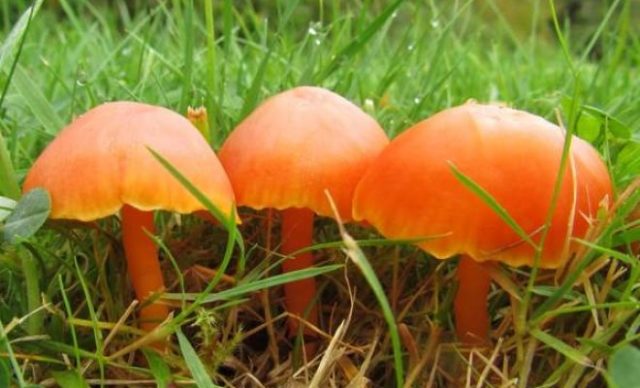
Skin and pulp color yellow-orange
The leg is hollow, short, cylindrical in shape. Its color is light yellow, sometimes whitish spots appear.
The mushroom is not poisonous, but does not have a high nutritional value. The pulp does not have a pronounced aroma and taste.
Meadow hygrocybe
The mushroom has a convex, round, dense cap. The color is apricot with a red tint. The surface is oily, becomes dry over time and cracks.
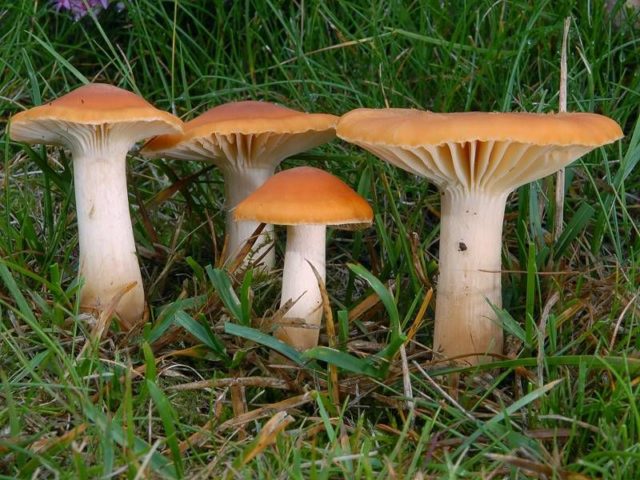
The leg is cylindrical, thick, short, tapering towards the bottom
The mushroom is edible, it does not differ in high taste. When cooking, it requires a long heat treatment.
Collection rules and use
Scarlet hygrocybe begins to collect from the middle of summer. You can find it in meadows in high thickets of grass.
The fruit body is small, not fleshy; to prepare a mushroom dish, you need to work a lot during the harvesting process.
Scarlet basidiomycete is cleaned, washed, then boiled or fried.
Often the bright fruiting body is used as a decoration for homemade mushroom dishes. The hygrocybe of scarlet looks especially beautiful in jars with pickled forest gifts.
Conclusion
Hygrotsibe scarlet is a bright, beautiful mushroom that is rarely found in the forests of Russia. It attracts lovers of quiet hunting not so much by its taste as by its spectacular appearance. But you should not bypass the crimson fruiting bodies, they can well be cooked with your favorite boletus mushrooms or russula.
